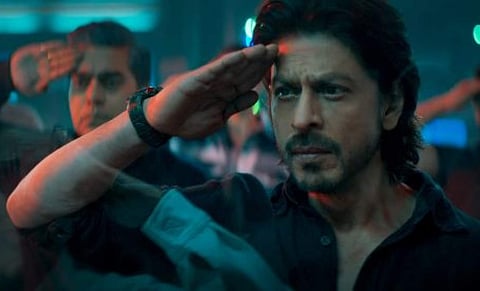

If there’s an element in Pathaan that is as pivotal as Shah Rukh Khan himself, it’s the allusion to “kintsugi”, the Japanese art form of repairing broken pottery with molten gold, which supposedly makes it even more precious than it originally was. Metaphorically, it’s about flaunting the beauty of your scars than keeping them hidden. When SRK invokes it on screen, it’s impossible to overlook the personal association it carries with respect to the embattled Bollywood, and of course, the target of intense hate that he has himself been in the last few years.
The success of SRK’s full-fledged return—not considering the Brahmastra cameo—to the big screen four years after Anand L Rai’s Zero in 2018, is not just in the crores that it has amassed at the box office (Rs 313 crore gross worldwide in three-day run as per the producers, Yash Raj Films) or the innumerable records that it has shattered. It’s in the razor-sharp line (dialogue by Abbas Tyrewala that is wonderfully in sync with SRK’s own sensibility) that emphatically asserts: “Pathaan zinda hai”. Bollywood and SRK are alive despite innumerable blows. In fact, they are more resilient and stronger.
Pathaan marks the dawn of a new role for SRK where the reel melds with the real. Borrowing a dialogue from the film itself, just when you thought that the chapter was over, he has written a whole new book. The actor, superstar, entertainer, glib talker, charmer, money-spinner, businessman and global soft power turns into an unequivocal hate repellant, armed with his unique brand of love and characteristic humour.
When Pakistani ISI spy Rubina Mohsin (Deepika Padukone) asks Pathaan if he is a Muslim, he says he doesn’t know, that he is an orphan who was left in a cinema hall by his parents, a place that has never been about any religion other than success—commercial or artistic. The Hindi film industry has been one of the most secular cultural institutions in India. Yet it has been split wide open and polarised in the last few years. The backlash against the industry since the death by suicide case of actor Sushant Singh Rajput in 2020 has also meant allegations of sleaze and immorality. Pathaan’s filmi origin story then is SRK’s call for sanity, harking back to the inclusive spirit at a time when Bollywood has been at the receiving bans and boycotts by reactionaries. Pathaan itself was in the eye of the storm over its song “Besharam Rang” featuring a saffron-coloured bikini. Things came to such a pass that Prime Minister Narendra Modi at the Bhartiya Janta Party’s recent National Executive meeting, had to reproach the party leaders and workers for making “unnecessary comments” on “irrelevant issues” like movies. SRK, his family, films and business have been targeted. His son Aryan Khan, arrested on charges of possessing drugs, had to spend time in jail though he was later found not guilty.
Against these odds, SRK makes a statement with a Patriot Act that might be in tune with the narratives currently in vogue but replaces the jingoism with humanism. The song “Jhoome jo Pathaan” is an ode to SRK’s own unique brand of “ishq” which involves protecting the supposed opponent at the cost of your own life. SRK might be a bare-chested macho man but one who needs painkillers for the aches and pains of middle age, who turns a woman, his boss Dimple Kapadia, into the biggest hero of the masculine world.
In the days to come, much will be scrutinised about SRK, the film and its politics. Not just its obvious lack of logic and predictability, it has already started facing the ire of the conservatives and liberals alike, from their two opposing standpoints, on the issue of its portrayal of Article 370, Pakistan, Hindustan, Kashmir, ISI, R&AW. While both expect the film to be a fierce ideological manifesto of their own kind, SRK prefers to be the subtle subverter calling for mending and healing, friendship, and love and yet brings out a lot of uncomfortable truths if you care to read between the lines or understand meta. In his first tweet after the declaration of mammoth success, SRK quoted Gattaca movie: “I never saved anything for the swim back”.
He then goes on to offer the wisdom of a 57-year-old: “I think life is a bit like that. You aren’t meant to plan your return. You are meant to move forward. Don’t come back. Try to finish what you started.” Pathaan marks a huge leap forward in an onward journey that started with Fauji in 1988. In these 35 years it never mattered whether you liked, disliked or were indifferent to him. SRK was and is a huge icon. Period. The resounding success of Pathaan in the aftermath of his personal traumas—and of the industry in general—has made him even bigger than he was. You can continue to like, dislike or be indifferent to him. It won’t matter. Amid all the aspirants and pretenders, and the many fake ones propped up, championed and endorsed, he is yet again the one and only resounding answer to the question: “Bollywood ka King kaun?”